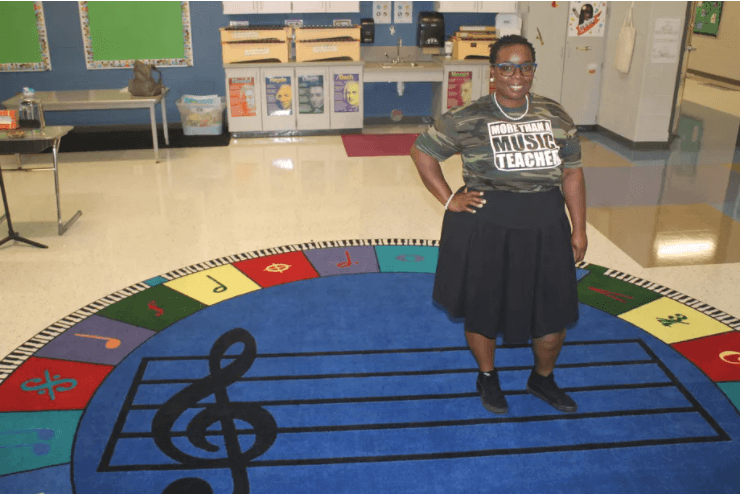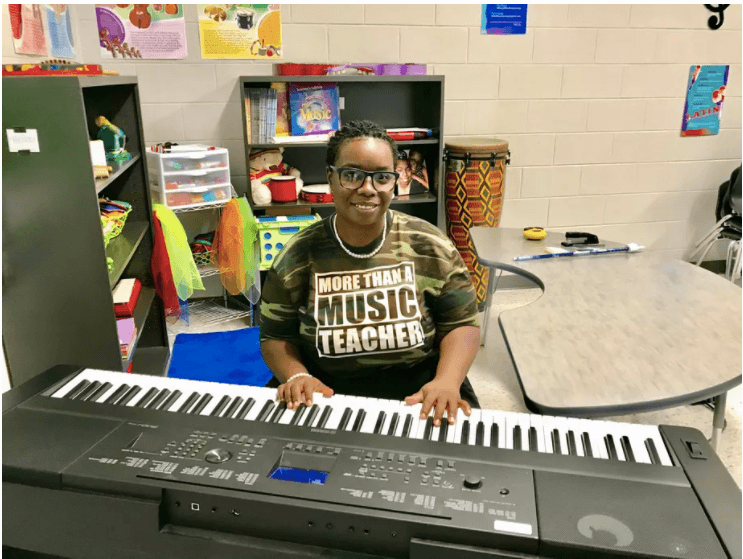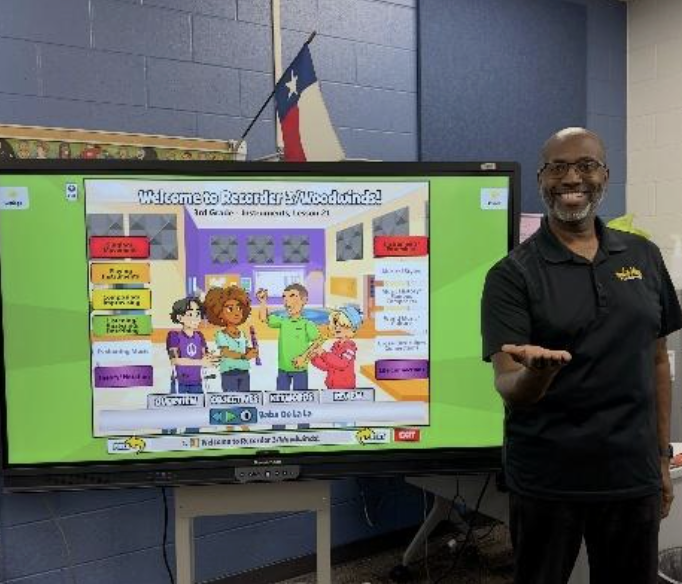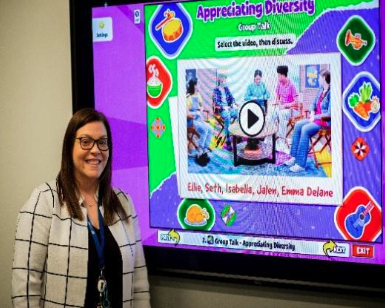Quaver Music Teacher Alicia Engram, a music teacher at Eagle View Elementary School in Nashville, Tennessee, is one of 30 music educators this year honored by the CMA Foundation, using the QuaverMusic curriculum to engage her students virtually. Read the story below.

Alicia Engram is one of 30 music educators from across the nation honored this year by the CMA Foundation, the philanthropic arm of the Country Music Association. Engram teaches at Eagle View Elementary School in Nashville, Tennessee.
Photo Credit: Marta W. Aldrich/Chalkbeat
To Alicia Engram, music is social.
Inside of her elementary school classroom in Nashville, Tennessee, she trains her music students to sing in unison, perform as a group, dance together, and listen to each other.
So when her school launched the academic year 100% virtually in August because of the coronavirus pandemic, Engram had to rethink her whole approach to music education.
“I asked myself, how do I teach music virtually without that social interaction?” she recalls about those early tenuous weeks. “Well, I’m doing it everyday — and loving every bit of it.”
While she misses the hugs and the structure of her music room after nine years of traditional teaching, Engram has embraced new ways to connect with her students online. She loves sending them on scavenger hunts in their homes to find household items that can be turned into instruments.
Her creativity and her desire to impact students through the universal language of music are two of the reasons Engram is among 30 music educators from across the nation honored this year by the CMA Foundation, the philanthropic arm of the Country Music Association. She received a $5,000 grant to invest in her classroom at Eagle View Elementary School, as well as her own professional development.
From her home in Nashville, a.k.a. “Music City U.S.A.,” Engram spoke with Chalkbeat about checking in on families during the pandemic, how she incorporates social-emotional learning in her virtual lessons, why she likes the song “Stinky Pirates,” and why she strives to “teach with grace,” now more than ever.
This interview has been lightly edited for length and clarity.
How did you prepare to pivot your classroom to online learning?
I am co-teaching this year, and we work together to think of ways our lessons can be as engaging as possible. We use an online curriculum called Quaver, which is a huge help with both live and asynchronous lessons. For instance, you can use Quaver to create videos for your students. And the students can use it to compose their own songs. My kids love to go on scavenger hunts to look for items at home that they can use to create music and sounds. We let them choose; we never tell them to find something specific. They’ll come back with pencils, bottles, toy bulldozers. Sometimes they’ll bring actual musical instruments. One child even showed up with an accordion.
What does a typical school day look like for you?
My school day starts at 7:45 a.m. and is over at 3:15 p.m. Parents have time to meet with me and ask questions about their child’s asynchronous music lessons, or just to talk about whatever they need it. Every day, I lead six live 30-minute classes virtually, kindergarten through fifth grade. In addition, our district has started a program where every staff member is assigned to about nine to 10 families. We reach out weekly to check on their well being, make sure they have what they need as far as technology, food, housing, and the like.
So far, what has been your favorite lesson to teach remotely — and what about it works well?
My favorite is my first grade lesson on meter. Meter is the underlying structure of how many strong and weak beats are in a measure. We use “Stinky Pirates,” a Quaver song, to introduce moving to music in the meter of 2. Our students pretend to be pirates, and we tell them to find what they can use to dress up like a pirate. It could be a scarf, shirt, or piece of fabric to tie around their head and cover up one eye like pirates do. A spoon in their hand becomes the hook. To see the excitement on their faces as they run around looking for these items gives me so much joy! We have a great time dancing and singing to the “Stinky Pirates” song. All the while, students are learning about the meter of 2, what it sounds like, how to count in the meter of 2, and how to recognize and move to music in this meter.
After months of isolation — and in some cases grief and trauma — there’s been a lot of talk about the importance of social-emotional learning this school year. Are you doing anything different to account for what so many families have been through?
We include social and emotional indicators in every lesson. Students get the opportunity to express what they like and dislike about certain types and styles of music. We also give students the opportunity to express how they are feeling with a “thumbs up, thumbs in between, and thumbs down” activity. We use that feedback to determine how we should continue with that lesson. Students who are comfortable sharing have a space to say why they chose their thumb levels. It opens up great conversation.
How about singing? Do your students get to sing much during online classes, especially since technical delays are inevitable through the internet?
We sing a lot! The students hear me and the music while they sing. But because of the latency issue, I have to make sure their microphones are muted. When I am teaching a song, I just keep going as if they’re all singing together on time. So they can get the opportunity to hear each other, I also allow time for some to share their beautiful voices with the class. Singing is a healthy outlet for kids. And the songs we sing have a lot to do with feelings and give healthy messages — things like we’re all different and we’re all unique.

Alicia Engram in the music room at her Nashville elementary school
Photo Credit: Marta W. Aldrich/Chalkbeat
How are you feeling about the 2020-21 school year so far?
Some days I feel great; some days I feel a bit overwhelmed. I am adapting to the online learning environment and trying to remain as positive and gracious as possible through this. Online learning is new for both teachers and parents, so I try to teach with grace, knowing that every student’s situation may be different.
Tell us about your own experience with school and how it affects your work today.
I grew up in Tuskegee, Alabama, where we only had one elementary school, one middle school, and one high school. Because the town was so small, everyone knew each other. We were like family. I loved school. It was like a second home for me! My teachers were amazing, and they’re the reason I decided to pursue a career in education.
What’s the best advice you ever received — and how have you put it into action in your classroom?
Just to never give up, even when it is hard. I got that advice from a lot of my musical mentors, and I put it into action every single day. There are some days I want to give up because life has a way of trying to knock you down, but I won’t let it. The words “never give up” are always in the back of my mind.
***
Article originally published by Marta W. Aldrich for Chalkbeat Tennessee on October 23, 2020.


